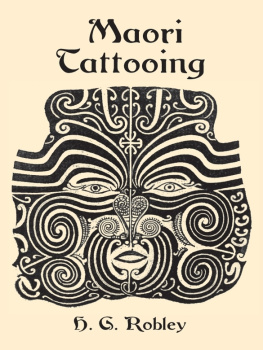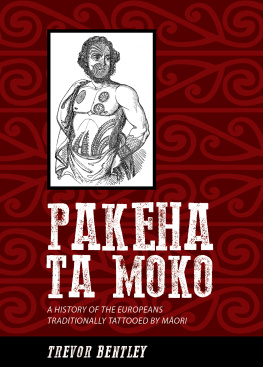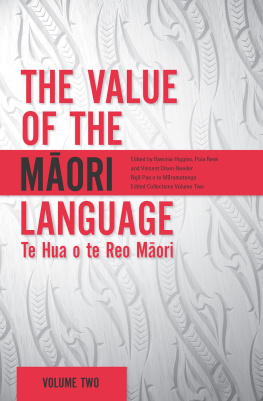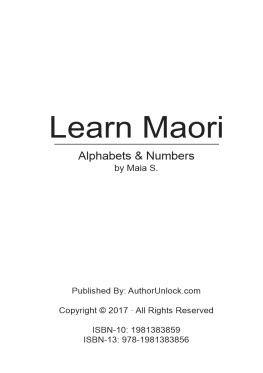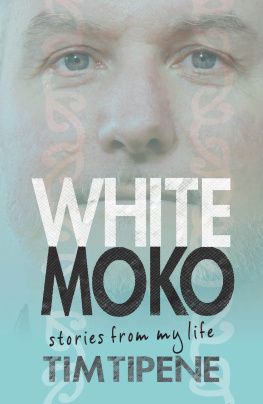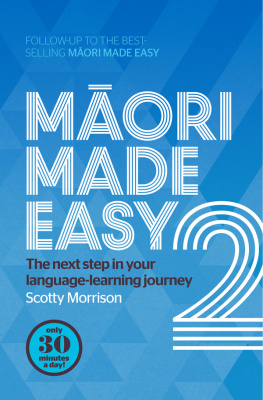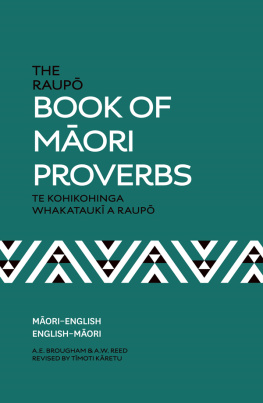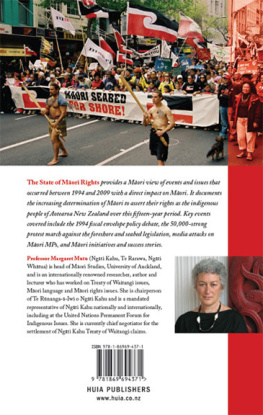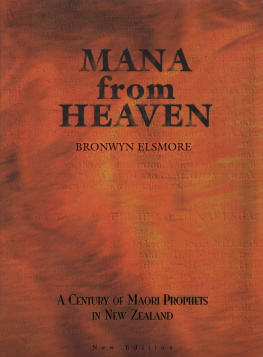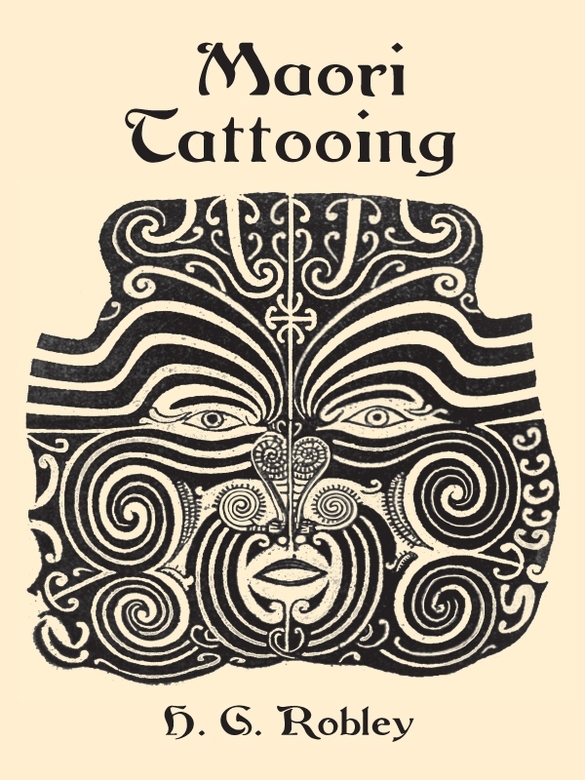AUTHORITIES CONSULTED
ANGAs, G. F. The New Zealanders Illustrated . London, 1847. Polynesia. London, 1866.
ANOUTCHINE, Professor D. N., of Moscow, President of the Imperial Society for Natural Science. Anthropology and Ethnography .
ANTHROPOLOGICAL SOCIETY of London.
BALFOUR, Henry, M.A., Esq., University Museum of Oxford.
BIDWILL, J. C., Esq. Rambles in New Zealand . 1839.
BOOS, J. R., Esq., Librarian, Royal Colonial Institute.
BROWN, Alex., Esq., Marischal College, Aberdeen.
BROWN, R., Dr. The Races of Mankind . London, 1875.
BROWN, W., Esq. New Zealand and its Aborigines. London, 1845.
BROWNE, C. R., Esq., M.D., Anthropological Laboratory, Trinity College, Dublin.
BROWNE, Montagu, Esq., F.G.S., &e., Leicester.
BRUTTON, E., Major.
BUCHNER, Dr. M., Munich.
BULLER, Rev. James. New Zealand Past and Present . London, 1880.
BULLER, Sir Walter, K.C.M.G., F.R.S.
BURTON, John, Esq., Falmouth.
CAPTAIN JAMES COOKS Voyages.
CASARTELLI, Rev. L. C., Manchester.
Church Missionary Registers .
CLARKE, C. M., Lt.-General, C.B.
COLENSO, W., Esq. On a Better Knowledge of the Maori Race . Transactions of the New Zealand Institute. Wellington, 1881.
COLMER, J. W., Esq.
COOTE, C. H., British Museum.
CRAIK, G. L. The New Zealanders Library of Entertaining Knowledge. London, 1824.
CROZET. Nouveau Voyage la Mer du Sud. Paris, 1783.
CRUISE, R. A., Major in 84th Regiment. Journal of a Ten Months Residence in New Zealand .
CUTTER, Miss E.
DALLAS, J., Esq., Exeter Albert Memorial Museum.
DANGERFIELD, H. E., Esq.
DARWIN, C.
DENTON, Geo., Esq., Wellington, New Zealand.
DIEFFENBACH, Ernest Travels in New Zealand by Routes through the Interior.
DILLON, Captain P.
DOLAN, Thos., Esq. M.D.
DOUBLEDAY, G. A., Esq., Anthropological Society.
DUMONT, DUrville. Voyage au Pole Sud. Paris, 1834.
EARLE, Augustus. Narrative of a Residence in New Zealand. London, 1832.
EDGE-PARTINGTON, J., Esq.
EDWARDS, Milne A., Natural History Museum, Paris.
EDWARDS, S., Esq.. Royal Colonial Institute.
ELLIS, W., Polynesian Researches. London, 1829.
ETHERIDGE, R., Esq., Australian Museum, Sydney.
FENTON, W. H., Esq.
FITZROY, Captain.
FOWLER, Miss.
FRANK, G. A., Esq.
FRANKS, Sir Augustus Wollaston, K.C.B.
GIGLIOLI, Professor H. H., Florence.
GOODE, G. Brown, Esq., Assistant Secretary, Smithsonian Institution, Washington, U.S.A..
Graphic , The.
GREY, Sir George, P.C., K.C.B., F.R.S., &c.
HAMILTON, A., Esq., Registrar of the University of Otago.
HAWKESWORTH, J. Voyages in the Southern Hemisphere . London, 1773.
HOCHSTETTER, Baron Ferdinand von.
HOCKEN, Dr. T. M., F.L.S.
HORNIMAN, F. John, Esq., M.P., F.R.G.S., F.Z.S., &e.
HUDSON, S. P., Esq., Hull.
HGEL, Baron von, Archological Museum, Cambridge.
HUTCHINSON, Jonathan, Esq., F.R.S., LL.D.
HUTTON, F. W., Canterbury Museum, Christchurch.
KENNAWAY, Walter, Esq., New Zealand Government.
KENNAWAY, L. J., Esq.
KERRY, Nicholls J., Esq., F.R.G.S. The Origin, Physical Characteristics , Manners , and Customs of the Maori Race . (The Journal of the Anthropological Institute of Great Britain and Ireland. Vol. 15.)
KING, W., Esq.
LANGLEY, S. P., Smithsonian Institution.
LAWRENCE, T. W. P., Esq., M.B., F.R.C.S.
LEDYARD, John. Journal of Captain Cooks Last Voyages , 1783. Hartford, Conn.
LEE, J. B., Esq.
LUBBOCK, Sir John, Bart., &c.
LUCAS, F. W., Esq.
MANING, F. E. Old New Zealand, by a Pakeha Maori. London, 1863.
MANTEGAZZA, Professor. The Senator, Florence.
MARGOLIOUTH, C. L., Esq.
MARSHALL, W. Barrett, Surgeon R.N. Second Visit to New Zealand.
MEDLICOTT, H. E., Esq., Secretary, Wiltshire Archaeological Society.
MERKEL, Fr., Professor, Gttingen.
MEYER, H., Professor, Leipsic.
MIDDLEBROOK, T. G., Esq.
MUNDY, Colonel J. Our Antipodes . 1847.
NICHOLAS, J. L. Narrative of a Voyage to New Zealand. London, 1817.
OBST, Dr., Director Leipsic Museum.
ODELL, Stackpool, Esq.
OPPENHEIM, Anne, Professor.
PARKER, J. W., Esq. British Colonisation of New Zealand. 1837.
PARKINSON, Sydney. Journal . London, 1773.
PIGORINI, Professor, Rome.
PLAYFAIR, H., Esq., M.D., Kings College, London.
POLACK, J. S., Esq. Manners and Customs of the New Zealanders. London, 1840.
POOLE, Mrs. C. G.
Quick, R., Esq., F.J.A., Curator, Horniman Museum.
RADLOFF, Dr., St. Petersburg.
READ, Hercules, Esq., F.S.A.
REGLIA, E., Assistant Curator, Anthropological Museum, Florence.
RIENZI, G. L. Domeny. Italian Edition . Venice, 1843.
RUSSELL, Purvis, Esq.
SAINTSBURY, Mrs.
SAVAGE, John, Surgeon. Account of New Zealand. Edinburgh, 1807.
SCHAUNSLAND, Professor, Bremen.
SCHERZER, Dr. Karl. Novara Expedition, 1857-8-9.
SCOTT, J. Alfred, Esq., M.D.
SHAW, L. E., Dr.
SHERRINS, R. A. A. Early History of New Zealand to 1840.
STACK, Rev. J. W.
STEWART, Professor Charles, Royal College of Surgeons.
STONEHOUSE, Wm., Esq., Literary and Philosophical Society, Whitby.
TAYLOR, Rev. Rich., M.A., F.G.S. Te ika a Maui. 1870.
THANE, G. D., Professor.
THOMSON, A. S., M.D. The Story of New Zealand. London, 1851.
TREGEAR, E., Esq., F.R.G.S.
UMLAUFF, J. F., Esq., Hamburg.
VALLANCE, David, Esq., Edinburgh.
VON LUSCHAN, Professor, Berlin.
WADE, W. R., Esq. A Journey in the Northern Island . Hobart Town, 1842.
WAKEFIELD, E. J., Esq. Adventure in New Zealand , 1839-44.
WALLACE, A. R., Esq.
WALSH, Rev. Phillip.
WEBSTER, W. D., Esq.
WELLCOME, Henry S., Esq.
WHITE, J., Esq. The Ancient History of the Maori : His Mythology and Traditions.
WILKES, Charles, Commander, U.S. Navy. Voyage round the World .
WORTH, N., Esq., Plymouth.
YATE, Rev. William. Account of New Zealand, and of the Church Missionary Societys Mission in the Northern Island. London, 1835.
YOUNG, R., Esq. The Southern World. London, 1858.
MOKO AND MOKOMOKAI
CHAPTER I
HOW MOKO FIRST BECAME KNOWN TO EUROPEANS
HISTORY may yet have more to tell us about the Maoris, but the earliest record of them we have is in the journal of the celebrated traveller Abel Tasman. His visit to New Zealand in December, 1642, was very short, and it ended in bloodshed. But Tasman and the artist who accompanied him, though they record much of the personal appearance of the Maori, make no mention of tattooing. We can hardly suppose that this remarkable feature escaped their observation, since the figure, complexion, hair, and dress are all described; and the conclusion is that in Tasmans days moko or tattooing did not exist. The Maori has only legends and oral traditions to account for his presence in New Zealand and for his customs such as moko. Maori tradition sheds little light on the origin of this custom. There is no reference in song or chant to help the investigator; and the most that can be done is to compare the observations of navigators with the latest knowledge. In this way we learn something of its rudiments, of its early simplicity, of its later richness and more perfect design, and ultimately of its decay. After a long gap of one hundred and twenty-seven years, we come upon the next mention of the Maori in history; and during that space of time nothing is known of New Zealand. Not until Captain Cook, the great navigator, visited these Islands in 1769 was anything more known. Captain Cook and the Endeavour returned to England in June, 1771, and then it was that the subject of this book became known. The treasures he brought back from the Southern Hemisphere and the drawings and journals he made will be referred to presently. In his time moko was much used in New Zealand. Native tradition has it that their first settlers used to mark their faces for battle with charcoal, and that the lines on the face thus made were the beginnings of the tattoo. To save the trouble of this constantly painting their warlike decorations on the face, the lines were made permanent. Hence arose the practice of carving the face, and the body with dyed incisions. The Reverend Mr. Taylor (an accepted authority on matters relating to the natives of New Zealand) is of opinion that moko or tattooing originated otherwise; and he assumes that the chiefs being of a lighter race and having to fight side by side with slaves of darker hues darkened their faces in order to appear of the same race. These two methods of accounting for the origin of moko are not inconsistent, and both may have had their share in bringing about the results which it is proposed to consider. No reliable evidence whatever exists as to the nature, meaning, extent, or elaboration of primitive moko. But the fact need not diminish its interest.

